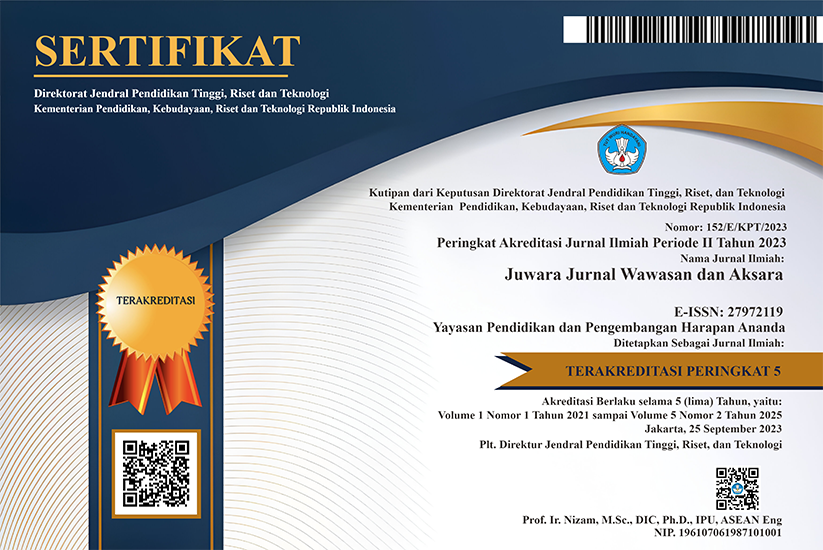Analysis of Interactive Learning Media Needs for Computer Network Installation in Grade X SMK
DOI:
https://doi.org/10.58740/juwara.v5i1.368Keywords:
computer network, interactive learning, need analysisAbstract
This study analyzes students perceptions of using interactive multimedia in Computer Network Installation learning. A quantitative descriptive method was employed, using questionnaires completed by 40 students enrolled in the course. Results indicate that most students support the use of interactive multimedia, mainly because it displays engaging objects (25.0%) and facilitates learning (17.5%). Additionally, 12.5% found the media attractive and appreciated that it does not require internet access. Smaller percentages noted benefits such as talent development and keeping up with technology (7.5% each). However, challenges were also identified, with 70.0% of students reporting difficulties in understanding how to use the media and 25.0% citing limitations due to their phone specifications. Only 5.0% reported no challenges. Overall, interactive multimedia received positive feedback, particularly for enhancing material visualization and easing learning. To address challenges, it is recommended to provide clear training on media use before implementation and to design multimedia compatible with students devices.
References
Arbi, H., & Juhana, A. (2024). A Literature Review: Examining Visual Design and Multimedia Elements Role in Fighting Misinformation and Strengthening Media Trust. IC-ITECHS. https://doi.org/10.32664/ic-itechs.v5i1.1534
Brasel, K. (2020). Survey Research. Health Services Research. https://doi.org/10.1007/978-3-030-28357-5_20
Cahya, S. T., Harahap, S. Z., Nasution, M., Dar, M. H., & Masrizal, M. (2020). Perancangan Aplikasi Game Dalam Pengenalan Pancasila Menggunakan Adobe Flash CS6. Journal of Computer Science and Information System (JCoInS), 1(1), 1-15. https://doi.org/10.36987/jcoins.v1i1.1841
Duran, A., Abes, E., Stewart, D., & Jones, S. (2024). Looking Back, Moving Forward, and Everything in Between: Revisiting Student Development's Relevance and Enduring Concepts. Journal of College Student Development, 65, 121 - 136. https://doi.org/10.1353/csd.2024.a923524
Geni, K. H. Y. W., Sudarma, I. K., & Mahadewi, L. P. P. (2020). Pengembangan Multimedia Pembelajaran Interaktif Berpendekatan CTL Pada Pembelajaran Tematik Siswa Kelas IV SD. Jurnal Edutech Undiksha, 8(2), 1–16. https://doi.org/10.23887/jeu.v8i2.28919
Haleem, P., Javaid, M., Qadri, P., & Suman, R. (2022). Understanding the Role of Digital Technologies in Education: A review. Sustainable Operations and Computers. https://doi.org/10.1016/j.susoc.2022.05.004
Handayani, R., Miaz, Y., Hidayati, A., & Bentri, A. (2024). Development of Interactive Multimedia Based on Adobe Flash CS6 to Improve Learning Outcomes. Jurnal Penelitian Pendidikan IPA. https://doi.org/10.29303/jppipa.v10ispecialissue.7838
Handoyo, T., Ashriyah, I., & Kamal, R. (2024). Pengembangan Bahan Ajar Berbasis Multimedia. Harmoni Pendidikan : Jurnal Ilmu Pendidikan. https://doi.org/10.62383/hardik.v2i1.1064
Harun, G., & Fitria, Y. (2023). Desain Multimedia Interaktif Berbantuan Software Adobe Flash CS6 untuk Siswa Kelas V SD. e-Jurnal Inovasi Pembelajaran Sekolah Dasar. https://doi.org/10.24036/e-jipsd.v10i2.10440
Huang, J. (2021). Using Information Technology to Improve the Quality of Education in Areas Lacking Educational Resources: Taking Southwestern Guizhou Prefecture in Guizhou, China as a Sample. SSRN Electronic Journal. https://doi.org/10.2139/ssrn.3878522
Magdalena, I., Shodikoh, A. F., Pebrianti, A. R., Jannah, A. W., & Susilawati, I. (2021). Pentingnya Media Pembelajaran Untuk Meningkatkan Minat Belajar Siswa SDN Meruya Selatan 06 Pagi. EDISI, 3(2), 312-325. https://doi.org/10.36088/edisi.v3i2.1373
Maryati, S., Susanto, T., Mela, A., Zebua, J., & Karomah, F. (2024). Improving the Quality of Education Through Technology-Based Learning. Perspektif Ilmu Pendidikan. https://doi.org/10.21009/pip.381.4
Nasution, M., Ritonga, T., Kurniawan, R., Ritonga, S., & Pohan, M. (2024). Analisis Media Pembelajaran Pengenalan Huruf dan Angka pada Tingkat Sekolah Dasar Menggunakan Adobe Flash Professional CS6. ALACRITY : Journal of Education. https://doi.org/10.52121/alacrity.v4i2.316
Permatasari, S. C., & Ekohariadi, E. (2023). Pengembangan Media Pembelajaran berbasis Website Interaktif Menggunakan Laravel untuk Meningkatkan Kompetensi Belajar Mata Pelajaran Basis Data Siswa Kelas XI RPL di SMKN 1 Surabaya. IT-Edu : Jurnal Information Technology and Education, 8(2), 168–180. https://doi.org/10.26740/it-edu.v8i2.56278
Prasetya, R. N., Budiman, R. D. A., Astuti, A., Friani, D. A., & Siradjuddin, S. (2025). Student Perceptions of the Use of Interactive Digital Media in Improving Learning Motivation. Juwara: Jurnal Wawasan Dan Aksara, 5(1), 32–41. https://doi.org/10.58740/juwara.v5i1.313
Puspita, S., & Irfandi, I. (2022). Meta-Analysis of Focusky Learning Media on Student Learning Outcomes. Jurnal Ilmu Pendidikan Muhammadiyah Kramat Jati. https://doi.org/10.55943/jipmukjt.v3i2.34
Putri, V. A. (2022). Perancangan Game Puzzle Pengenalan Lingkungan Sekolah Pada Anak TK Berbasis Adobe Flash CS6. Informatika, 10(1), 43-53. https://doi.org/10.36987/informatika.v10i1.2585
Ramgadwala, H. (2024). Impact of multimedia on academic information literacy instruction in libraries. IFLA Journal. https://doi.org/10.1177/03400352231222042
Razali, S., Ismail, A., Yazid, F., Ahmad, M., Hashim, S., Rohanai, R., & Shafieek, M. (2023). TVET in The 21st Century: Exploring Multimedia Elements in Digital Teaching and Learning Based On Art Content. Journal of Technical Education and Training. https://doi.org/10.30880/jtet.2023.15.01.002
Reza, F., & Tinggogoy, F. L. (2022). Konflik Generasi Z Di Bidang Pendidikan Di Era Revolusi Industri 4.0 Tantangan dan Solusinya. PARADIGMA : Jurnal Administrasi Publik, 1(2), 142-155. https://doi.org/10.55100/paradigma.v1i2.51
Samala, A. D., Howard, N.-J., Criollo-C, S., Budiman, R. D. A., Hakiki, M., & Hidayah, Y. (2024). What Does an IMoART Application Look Like? IMoART—An Interactive Mobile Augmented Reality Application for Support Learning Experiences in Computer Hardware. International Journal of Interactive Mobile Technologies (iJIM), 18(13), pp. 148–165. https://doi.org/10.3991/ijim.v18i13.47565
Vaganova, O., Pavlova, E., Petrova, O., Lapshova, A., & Bulaeva, M. (2020). Educational technologies as a means of developing students' independence. Artificial Intelligence, 9, 485-492. https://doi.org/10.34069/ai/2020.27.03.52
Vagg, T., Balta, J., Bolger, A., & Lone, M. (2020). Multimedia in Education: What do the Students Think?. Health Professions Education. https://doi.org/10.1016/j.hpe.2020.04.011
Wahyuni, E., & Fitriana, F. (2021). Implementasi model pembelajaran project based learning (pjbl) dalam meningkatkan hasil belajar peserta didik pada mata pelajaran pendidikan agama islam SMP Negeri 7 Kota Tangerang. Tadarus Tarbawy: Jurnal Kajian Islam dan Pendidikan, 3(1). http://dx.doi.org/10.31000/jkip.v3i1.4262
Wulandari, A., Salsabila, A., Cahyani, K., Nurazizah, T., & Ulfiah, Z. (2023). Pentingnya Media Pembelajaran dalam Proses Belajar Mengajar. Journal on Education. https://doi.org/10.31004/joe.v5i2.1074
Downloads
Published
How to Cite
Issue
Section
License
Copyright (c) 2025 Ratih Widya Nurcahyo, Sri Koriaty

This work is licensed under a Creative Commons Attribution-NonCommercial 4.0 International License.
JUWARA: Jurnal Wawasan dan Aksara provides open access to anyone so that the information and findings in these articles are useful for everyone. This journal's article content can be accessed and downloaded for free, following the creative commons license used.




















